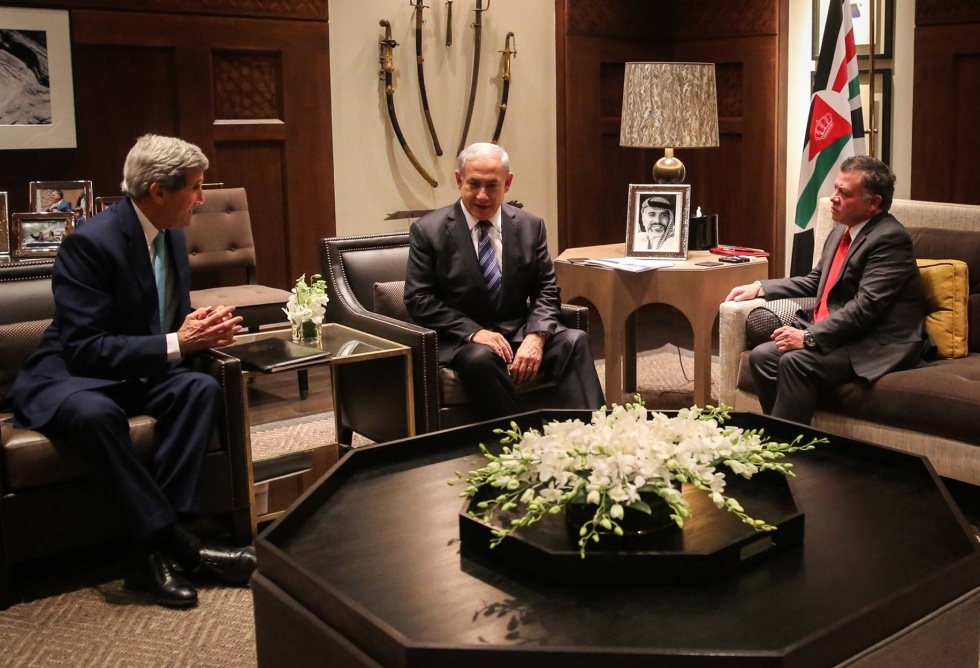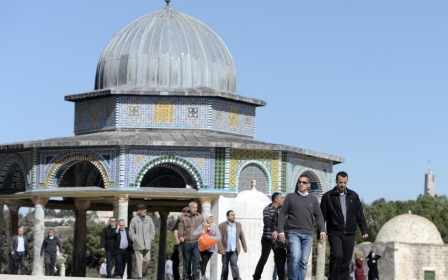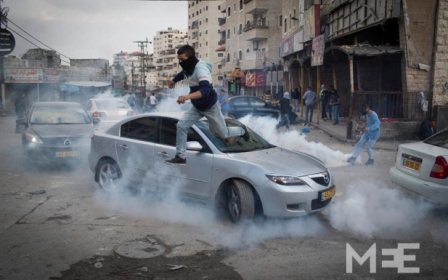Kerry meets with Abbas, King Abdullah and Netanyahu

US Secretary of State John Kerry mounted a diplomatic push Thursday to calm surging tensions in Jerusalem through talks in Amman with Israeli Prime Minister Benjamin Netanyahu and Jordan's king, Abdullah II.
The meeting at King Abdullah II's palace came hours after talks between Kerry and Palestinian president Mahmud Abbas.
"They will focus on ways to restore calm and de-escalate tensions in Jerusalem," State Department deputy spokeswoman Marie Harf said ahead of the talks in the Jordanian capital.
The meeting was allegedly followed by another unscheduled meeting at the Royal Palace, attended by both Kerry, Abdullah and Netanyahu.
A press conference, scheduled for 7.30 local time (17.00 GMT) has yet to happen.
“Apparently Kerry is still at the Royal Court, and his car has not even left yet which makes us believe that there is some kind of movement going on regarding the issues,” said Sara Elizabeth Williams, a journalist and MEE contributor based in Jordan. “The second meeting [with all three] was very much unplanned.”
Tensions over the al-Aqsa compound, as well as the issue of Palestinian statehood are expected to dominate discussions.
“It is looking increasingly likely that Abbas wants to put the motion on Palestinian statehood in front of the UN soon, possibly within the next two weeks,” said Williams.
“Kerry is likely trying to dissuade that from happening and trying to reach some kind of deal.”
The flurry of diplomatic activity followed new clashes in East Jerusalem where Israeli police fired tear gas, sound bombs and rubber bullets to disperse Palestinian demonstrators.
Netanyahu’s decision to attend the Amman-based talks is being interpreted as a clear sign that the situation is very serious and that the Israeli Prime Minster is trying to calm the situation.
“Very clear admission [from Israel] that the situation is spiralling out of control and that Israel needs outside help,” Imtiaz Tyab, al-Jazeera’s correspondent in West Jerusalem said.
Months-long unrest in annexed East Jerusalem has in recent days spread to the occupied West Bank and Arab communities across Israel, sparking debate about the prospect of a new Palestinian uprising.
On Wednesday Israel approved plans for another 200 settler homes in annexed east Jerusalem - a move sharply criticised by Washington.
Kerry and a sombre-looking Abbas embraced and had a brief whispered exchange as they met at the Palestinian leader's hillside villa in Amman where the US and Palestinian flags hung in front of a large night time photo of Jerusalem's flashpoint al-Aqsa mosque.
Much of the unrest in Jerusalem has been fuelled by Israeli moves to step up settlement activity in the city's eastern sector and by religious tensions at the al-Aqsa compound, a site holy to both Muslims and Jews.
Earlier, a tense confrontation erupted in the city's Issawiya neighbourhood as about 100 residents, including schoolchildren, tried to block a main road after police closed off several neighbourhood entrances with concrete blocks.
A local activist denounced the blocks as "collective punishment" against Palestinians in Jerusalem.
An 11-year-old Palestinian boy was wounded in the clashes when a non-lethal round fired by Israeli police hit him between the eyes, medics said.
The Palestinians have also been infuriated by a far-right Jewish campaign for prayer rights at al-Aqsa, although Israel insists it has no plans to change the decades-old status quo.
"The big fear that Jordanians and the Palestinians have is that the Israeli parliament will legislate that Jews can pray in al-Aqsa and of course there is a lot of grey areas between legislating and turning a blind eye to it happening," Williams said.
Israel's Public Security Minister Yitzhak Aharonovitch said the authorities were on alert for more unrest, after several attacks in recent weeks by Palestinians wielding knives or ploughing cars into pedestrians. More than a dozen people have been killed in the violence, including four Israelis.
"I believe there will still be terror attacks and other incidents in the near future," he said.
'Red line'
Abbas's spokesman said ahead of the meeting that the Palestinian leader was expected to tell Kerry of his growing concerns over Israel's actions, particularly in Jerusalem.
"The Palestinian position will be made crystal clear: the Israeli violations are a red line and cannot be tolerated - especially with the tension and Israeli escalation in l-Aqsa and Jerusalem," Nabil Abu Rudeina told AFP.
Kerry also met King Abdullah who called for Israel "to put an end to its unilateral action and repeated attacks against holy sites in Jerusalem, especially those targeting the al-Aqsa mosque compound," his palace said.
Abdullah said there was "no alternative to the establishment of an independent Palestinian state", with East Jerusalem as its capital, in order to achieve peace. Israel, however, maintains that Jerusalem must become the united capital of the Israeli state.
Jordan, which has custodial rights at al-Aqsa, last week recalled its ambassador to Israel after police clashed with Palestinians inside the mosque compound.
In a letter to the UN Security Council sent on Wednesday, Palestinian ambassador Riyad Mansour demanded international intervention over Al-Aqsa, warning tensions could "spiral out of control".
In a move likely to further heighten tensions around Aa-Aqsa, Aharonovitch said late Wednesday he would reinstall metal detectors at the entrances along with facial-recognition technology.
"We'll increase the supervision of people entering the compound, both Jews and Muslims," he said.
Sheikh Azzam al-Khatib, head of the Islamic Waqf which runs the compound, rejected the idea.
"This is unacceptable to all Muslims. It cannot be installed," he told AFP.
Middle East Eye propose une couverture et une analyse indépendantes et incomparables du Moyen-Orient, de l’Afrique du Nord et d’autres régions du monde. Pour en savoir plus sur la reprise de ce contenu et les frais qui s’appliquent, veuillez remplir ce formulaire [en anglais]. Pour en savoir plus sur MEE, cliquez ici [en anglais].




